Bangladesh marks a significant leap in sustainable transportation with the launch of ZigZag Car, the country’s inaugural app-based carpooling service. As the nation grapples with increasing traffic congestion and environmental concerns, ZigZag Car emerges as a promising solution to reduce the number of vehicles on the road while fostering a sense of community-driven mobility.
ZigZag Car: A Green Initiative
ZigZag Car introduces a novel approach to transportation, encouraging passengers heading in the same direction to share a single vehicle. The platform envisions a scenario where, instead of four individuals driving four cars, they share a common ride. This simple yet impactful concept aims to alleviate traffic congestion and curb carbon dioxide emissions, aligning with global green initiatives.
Riding the Global Wave: Online Carpooling Gains Prominence
The rise of online carpooling services from the Middle East to India coincides with increased advocacy for reduced car usage to combat the greenhouse effect. ZigZag Car enters this global narrative by providing an app-based platform that connects drivers and passengers traveling along similar routes. The emphasis on utilizing artificial intelligence (AI) and GPS ensures a seamless and hassle-free carpooling experience.
ZigZag Car’s Operational Framework
The functionality of ZigZag Car revolves around connecting drivers and passengers sharing common routes. Through the AI-powered mobile app, individuals can post their trip schedules, allowing potential riders to join and split the travel costs.
The app acts as a matchmaker, facilitating a shared commuting experience. Notably, the platform employs stringent digital verification processes for drivers and passengers, fostering a secure and community-driven ecosystem.
Bangladesh’s Transportation Landscape
Against a growing number of private passenger cars, reaching 394.09 thousand, and microbuses numbering 113.53 thousand registered till August this year, ZigZag Car emerges as a timely intervention. The platform’s introduction signifies a shift toward more sustainable transportation options, addressing the challenges posed by increasing number of vehicles on the roads.
Conclusion
ZigZag Car marks a groundbreaking initiative in Bangladesh’s transportation landscape, offering an innovative solution to traffic congestion and environmental concerns. As the first app-based carpooling service, it holds the potential to transform how individuals commute and contribute to a greener, more sustainable future.
With a commitment to community-driven practices and global aspirations, ZigZag Car sets the stage for a paradigm shift in Bangladesh’s approach to mobility.




